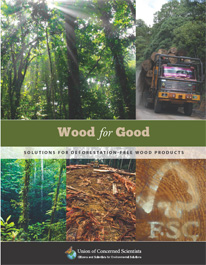Consumer demand 'can influence sustainable forestry'
-----------------
Harvesting forestry sustainably and profitably is entirely possible, but requires consumers and businesses to pressurise governments into action.
This is view of The Union of Concerned Scientists (UCS), who have released a report entitled Wood for Good: Solutions for Deforestation-Free Wood Products, in which they analyse tropical wood production's effect on deforestation and assess the sustainable solutions.
Pipa Elias, UCS consultant and report author, commented: "The demand for tropical wood is growing globally, while more and more of the world’s tropical forests are disappearing.
"It is 100 per cent possible to harvest timber in the tropics profitably and sustainably. The main roadblock is a lack of political will. Businesses and consumers must demand responsibly manufactured products – giving governments and wood producers an incentive to expand sustainability efforts."
The solution to the issue as proposed in the report involves taking a threefold approach. Firstly, wood producers and businesses should turn to responsible plantation forests to harvest wood. Secondly, these sustainable plantations are best established on previously degraded lands and should be used for sustainable forest management practices, such as protecting the wildlife in the area. Finally, governments, businesses and consumers need to start demanding products certified by schemes such as the Forest Stewardship Council to help maintain the profitability of the wood industry while protecting forests.
Ms Elias explained: "Consumers certainly have an important role to play in safeguarding tropical forests. Small, everyday choices like recycling and reducing the demand for new wood absolutely help to protect tropical forests."
Solutions for Deforestation-Free Wood Products (2012)
Smart choices by consumers, businesses, and governments can significantly reduce the impacts of logging in tropical forests, download the report here...
Wood from tropical forests is used to create products in our everyday lives, including furniture, paper, and kitchen cabinets. But while wood is a renewable resource, many logging activities in the tropics are done without regard to the forest ecosystem. Over time this can limit the forests' ability to regrow, leading to reduced biodiversity and increased global warming pollution.
 Logging activity can also pave the way for increased deforestation as logging trucks create in-roads that allow access for agricultural development, especially the production of vegetable oils and beef, two primary drivers of tropical deforestation.
Logging activity can also pave the way for increased deforestation as logging trucks create in-roads that allow access for agricultural development, especially the production of vegetable oils and beef, two primary drivers of tropical deforestation.
Wood can be sustainably produced, however, if it comes from well-managed forest, including plantations grown on previously cleared land. Certification programs such as the Forest Stewardship Council (FSC) can help consumers and businesses identify wood grown in a sustainable manner—and offer the best available option to protect our world's forests for generations to come.
Wood for Good: Solutions for Deforestation-Free Wood Products looks at how smart choices by consumers, businesses, and policy makers can help reduce the impacts of wood production on deforestation and reviews the economics and environmental impacts of the global wood industry.
Wood exports from the tropics are increasing and are part of our everyday lives.
- The international wood product trade has rapidly expanded in recent decades. From 1985 to 2005, international trade of forest products increased from $60 billion to $257 billion; by 2020, it is expected to reach around $450 billion. In 2009, tropical forests accounted for 8 to 20 percent of global production in the major wood product sectors.
- In 2009, the average North American consumed more than 500 pounds of paper products—equivalent to approximately 100 reams of letter-sized copy paper, and more than five times the global average. As much as 42 percent of the worldwide timber harvested for industrial purposes is used to make paper products, including wood from tropical forests. Brazil and Indonesia are the sixth and eighth top producers, respectively, of wood pulp for paper.
- Of the 15 major exporters of furniture, six are now in tropical developing countries: Brazil, Indonesia, Malaysia, Mexico, Thailand, and China.
Tropical logging has significant impacts.
- Trees absorb and store carbon as they grow, and clearing forests causes the carbon to be released back into the atmosphere. Tropical deforestation is responsible for about 15 percent of global warming emissions worldwide.
- When primary forests are cleared for conversion to pulp and paper plantations, it leads to a loss of biodiversity and an increase in carbon emissions because plantations rarely accumulate as much biomass or provide the same habitat as the natural forest they replaced.
- Tropical logging is also often done illegally, depressing world timber prices by 16 percent and negatively affecting legitimate wood producers.
Wood can be sustainably produced if it comes from well-managed forests, including plantations grown on previously cleared land.
- Plantation forests are a good solution for growing wood as they can provide a higher yield per acre than natural forests, but are only sustainable if they are established on previously disturbed lands, rather than replacing primary (virgin) forests.
- Governments can make these sustainable approaches more attractive for businesses and local communities, and support their implementation, by improving land tenure systems and placing a value on ecosystem services such as protection against soil erosion and air and water purification.
Consumers, businesses, and governments can all support sustainable forest management
- Certification programs, most notably the Forest Stewardship Council (FSC) and the Programme for the Endorsement of Forest Certification, promote sustainable wood production globally. While these certifications do not definitively prohibit logging from primary forests, they are the best available option for ensuing that wood production does not come at the expense of forest ecosystems.
- Consumers, retailers, and producers should demand certified wood for their products, even for lower-end items.
- Governments and policy makers need to change forest production policies, promote certification programs, generate markets for sustainably produced wood, and promote legal production systems.
---------------

